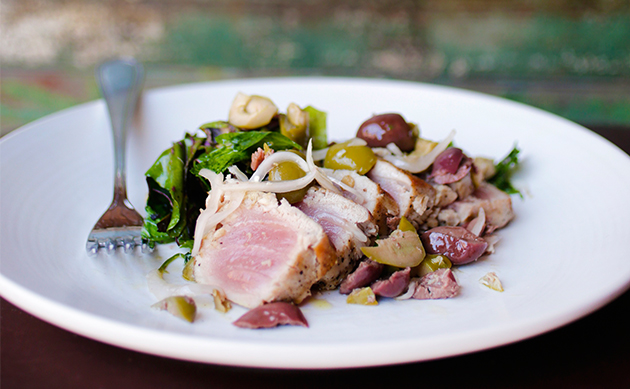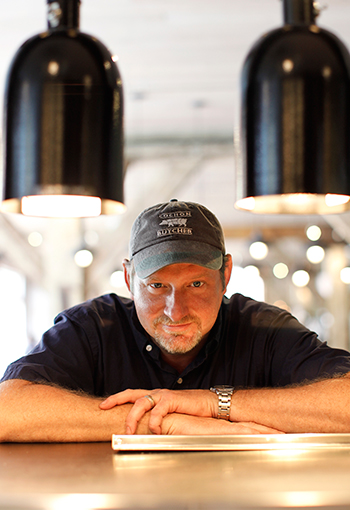
Donald Link has come a long way since his days of being a 15-year-old cooking alongside his grandfather. A Louisiana native who worked at multiple restaurants before attending the California Culinary Academy, Link would build a reputation for himself in Bay Area kitchens such as Jardinière, The Elite Cafe and now-shuttered Bizou. He returned to New Orleans in 2000 to open Herbsaint and won accolades for his French-influenced Southern Creole cuisine. After debuting the more rustic yet upscale Cochon and its adjacent deli counterpart Cochon Butcher, Link won a James Beard Award for Best Chef: South in 2007 while his first cookbook, Real Cajun: Rustic Home Cooking from Donald Link’s Louisiana, earned Best American Cookbook honors in 2009.
Link’s latest wildly successful restaurant, Pêche Seafood Grill, was named a finalist for a 2014 James Beard Award for Best New Restaurant, and his Pêche partner chef, Ryan Prewitt, nabbed a nomination for Best Chef: South. Link, himself, was a semifinalist for Outstanding Chef at Herbsaint. Somehow, through all of this epicurean excitement, he also managed to find the time to research, write and release his second cookbook, Down South: Bourbon, Pork, Gulf Shrimp and Seconds of Everything.
The humble chef took the time to talk to us about the Southern home cooking that opened his eyes to food, brought him back home and continues to inspire him today.
What are some of your favorite food memories from growing up in Louisiana?
I had a great situation growing up, where both sets of my grandparents lived a half mile from each other. I come from big families, so we had grand meals made with food my granddad had farmed, fished and hunted. Rabbit and dumplings, creamed corn, smothered greens and great cornbread were a small sampling of what he would cook.
Which chefs were most inspiring to you as you began your career?
When I grew up, there were not a lot of chefs, really. I always held my grandparents’ cooking at the highest respect. Still do.
Can you talk a little bit about what called you back to Louisiana from California? What it was like to return?
I learned a lot in the Bay Area about sourcing food and cooking in a way that let the ingredients shine. I feel it really helped me find a new, fresh approach to cooking the foods I grew up with. I loved living in San Francisco, but the birth of my first child brought me back home. I wanted my children to have to a Southern upbringing as I did. I can’t say enough about how strong the food culture is here, and it is and always will be home to me.
How has the culinary scene in New Orleans evolved since you first opened Herbsaint in 2000?
When I first got here, I was surprised by the lack of access to farms and fresh produce. It seemed to me that the food scene had stalled for some time. Now, you see a lot of local chefs doing food with more influences from around the world and not just the standard Creole fare.
How would you describe your personal culinary style, and has that evolved through the years?
I spent several years cooking classic French and French-California styles. When I first opened Herbsaint, I stuck to that style and eventually embraced my roots and culture, and began to bring more of that country-French style into the food I grew up with.
What are your signature menu items at your various restaurants?
Each restaurant has its own. The duck confit and the spaghetti with poached egg are the most popular at Herbsaint. Cochon [is famous for] the pork dish, and the rabbit and dumplings. Pêche is known for its whole fish cooked over wood coals.
Where are you spending most of your time lately — spread among all of your restaurants or mostly at Pêche?
I tend to move around a lot between the restaurants. Each restaurant has a chef de cuisine and sous chefs that do an amazing job in the kitchen and allows me to work on new ideas and the books. At Pêche and Cochon, I have chef partners that run the restaurants. Let’s put it this way — I have a lot of meetings every week.
In researching and writing Down South, did you find Southern cooking has changed since you grew up?
When I grew up, Southern food was pretty straightforward. Now I see a lot of influences from other cultures mixing with the classic Southern dishes — some good, some not good. I also find the super-traditional Southern food hard to find sometimes, but when I do, it’s quite a treat.
Do you have more restaurants, cookbooks or projects on the horizon?
We are looking at expanding the Cochon Butcher shops into other cities and have also started a wholesale business selling the meats we make at Cochon Butcher. I will probably do another book, but not until something inspires me to do so.
Photos Courtesy of Chris Granger


